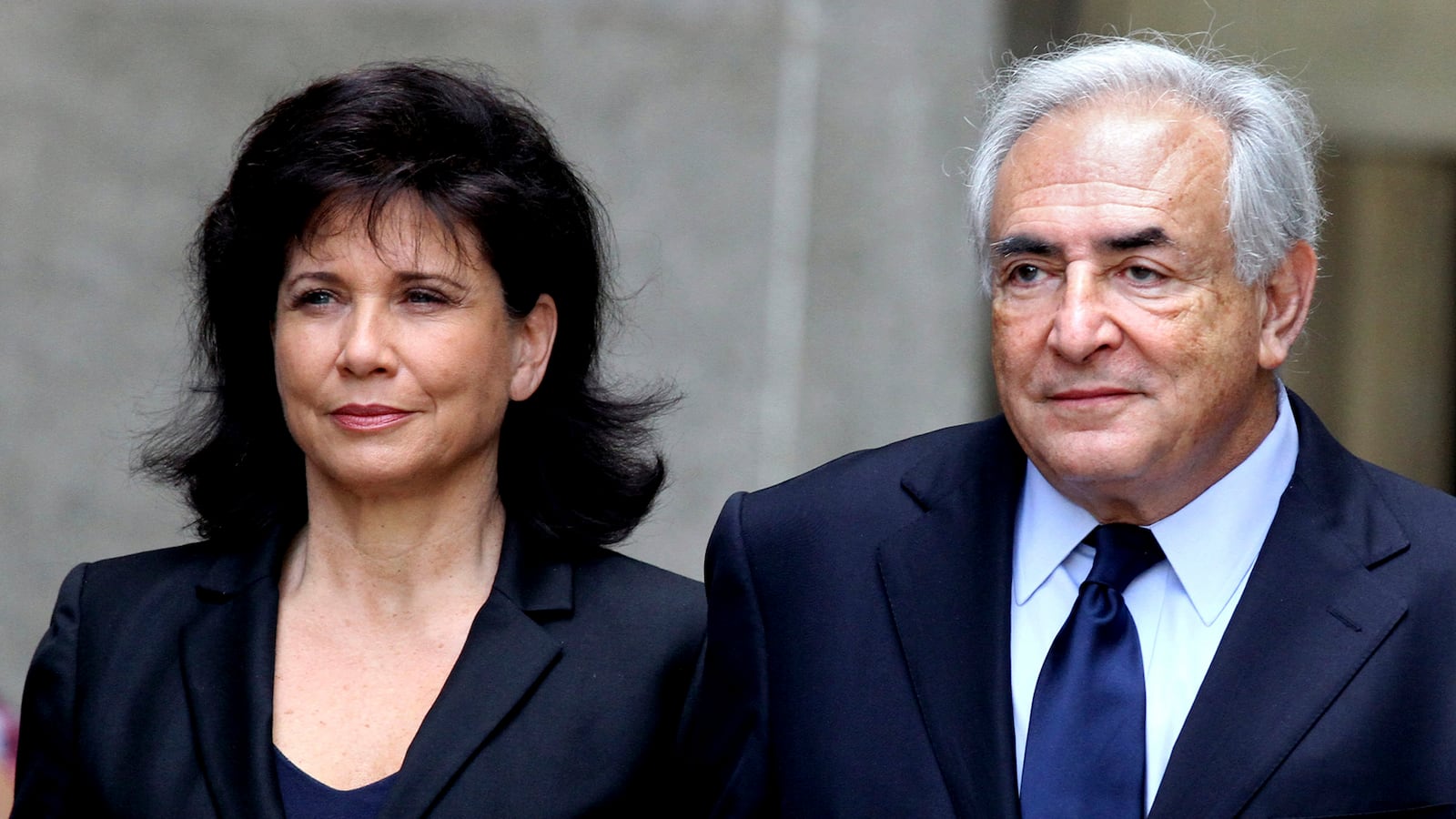Persistent rumors in France of a split between Dominique Strauss-Kahn and his wife, Anne Sinclair, took on new weight on Tuesday as Agence France Presse reported the couple's end. The news agency quotes an anonymous source close to the disgraced former International Monetary Fund chief Strauss-Kahn saying the pair are keeping separate Paris residences after splitting at least a month ago. When a French tabloid magazine reported the same on Friday, Strauss-Kahn and Sinclair's lawyer said they would sue for invasion of privacy.
The breakup report comes nearly 14 months after Strauss-Kahn's cataclysmic political demise, when the onetime favorite for France's 2012 presidential election was accused of attempting to rape a Times Square Sofitel chambermaid. Manhattan criminal charges against DSK were dropped last August, but he still faces a civil suit brought by chambermaid Nafissatou Diallo in the Bronx and a charge of "aggravated pimping" in a prostitution-ring investigation in Lille, north of Paris. Strauss-Kahn and Sinclair, both 63, had celebrated 20 years of marriage in November.
The story of Strauss-Kahn and Sinclair’s reported split will have a dog-bites-man quality in France and beyond, the mystery to many being how the breakup didn’t come sooner. In a poll conducted by the French edition of Elle in September, shortly after Strauss-Kahn's return to France, 54 percent of French women polled approved of Sinclair's supportive attitude toward her husband, even though only 17 percent thought that Sinclair believed he was innocent. More pointedly, 74 percent of the women surveyed said that they, personally, would have left him. When another French poll named Anne Sinclair 2011’s Woman of the Year, one top (woman) politician sneered that Sinclair was “not a model for women.”

Indeed, in the weeks immediately following the Elle poll, Strauss-Kahn's predicament went from bad to worse, while Sinclair appeared, at least publicly, unswayed. In October, Paris public prosecutors dropped a separate attempted-rape case, following accusations from young French novelist Tristane Banon regarding a 2003 incident. But the same authorities suggested Strauss-Kahn may have faced sexual-assault charges in that case had a statute of limitations not already expired.
Only days later, it was revealed that Strauss-Kahn's name had come up in the sinewy Carlton Affair, a prostitution ring case in France and Belgium that many saw as the final nail in the coffin of his career. So began a graphic series of embarrassing leaks to the press of testimony about group-sex parties that Strauss-Kahn was alleged to have attended internationally, in Europe and Washington. Strauss-Kahn spent a night in custody for questioning in that case in February, and the charge for aggravated pimping was laid in March. In May a French prosecutor ordered a preliminary inquiry into a gang-rape allegation against Strauss-Kahn, which is said to have come to light in the testimony of a Belgian prostitute about a sex party in a Washington hotel. Strauss-Kahn has not been charged in that inquiry, word of which spurred one of his lawyers to criticize a relentless pursuit of his client and emphasize the fact that the alleged victim herself had not pressed any charge.
Anne Sinclair, meanwhile, has seemed keen to move on this year, at least professionally. More than the stoic, stand-by-your-man figure who posted a $6 million dollar bail and bond in Manhattan to get her husband out of Rikers Island prison last May, Sinclair was a top television journalist in the 1980s and 1990s, interviewing luminaries Diane Sawyer–style, even as Strauss-Kahn was rising through the political ranks. (The pair met on the set of her TV show in 1989.)
“I am neither a saint nor a victim. I am a free woman,” she told Elle in January. “If women felt disappointed in me, I’m sorry to say it, but that’s their problem!” She was named editorial director of France's edition of the Huffington Post. An extraordinary 270 journalists turned out for the introductory press conference—for a news site that launched with only eight staffers. Sinclair has kept a regular column on the site, reportedly making herself scarce on days when the latest Strauss-Kahn news is featured prominently.
In March Sinclair released a deeply researched book years in the making documenting her illustrious family history. Sinclair's grandfather Paul Rosenberg was a gifted art dealer with a sharp (lucrative) eye for talent and the confidant of masters including Picasso. In 1940 Rosenberg fled German occupation to New York after hiding 400 paintings, many of which would nevertheless fall into Nazi hands. After the war, as Sinclair details in 21 rue La Boétie, Rosenberg would spend years hunting down his stolen masterpieces. Sinclair herself was born in New York in 1948 and raised in Paris, an heiress to Rosenberg's art fortune. Reading the book in context, one couldn't help feeling Sinclair was putting new shine on the Rosenberg name, most recently associated as it was, however indirectly, with her husband's alleged sordid misdeeds. The art dealer had featured in stories around the world explaining how his granddaughter was footing Strauss-Kahn's monumental bail or covering the $50,000/month TriBeCa townhouse the pair took on short notice to serve out his house arrest after other New York landlords turned up their noses.
Three weeks ago, the glossy weekly Paris Match put Anne Sinclair on its cover, alluding to split rumors, claiming the couple couldn't step out of their posh Place des Vosges apartment without being insulted by passersby.
One saving grace, at least for Strauss-Kahn’s place in the history books, has been that despite his untimely political demise, a fellow Socialist still managed to win the presidency. François Hollande’s victory in May appeared to relegate Strauss-Kahn’s shocking fall from grace to a footnote in French history, little more than a personal nightmare for one brilliant economist and his glamorous wife. Indeed, the ongoing reports on Strauss-Kahn’s legal quagmire don’t make nearly the splash they did a year ago. But that doesn’t mean his compatriots aren’t curious to understand the lingering mystery of France almost-first couple, and how Sinclair stuck around. French beach reading this summer? The Strauss-Kahns, by a pair of Le Monde journalists, is already a No. 1 bestseller.






